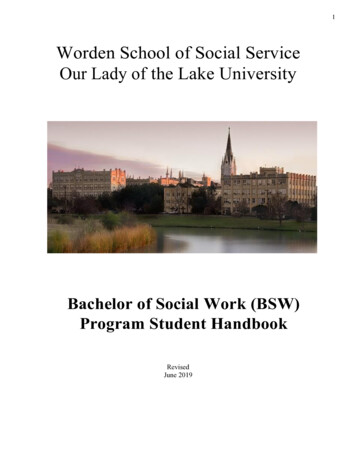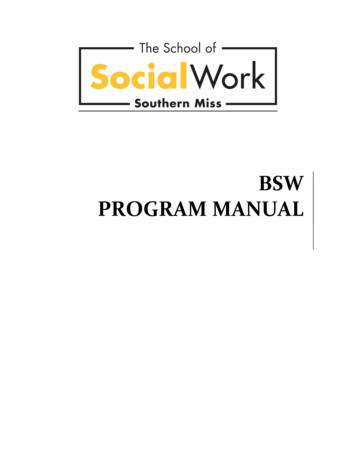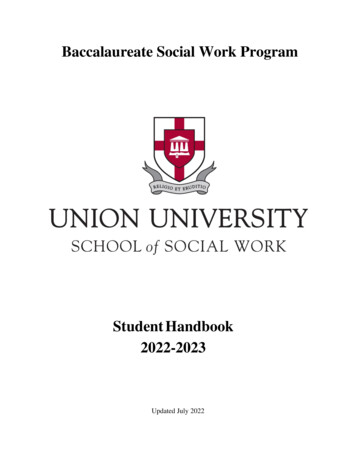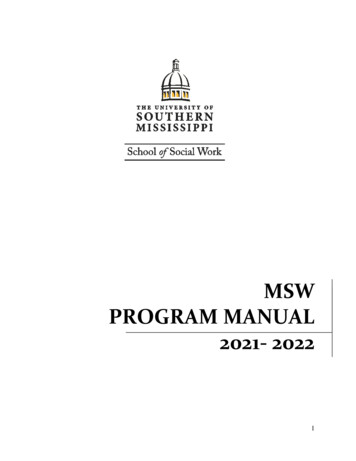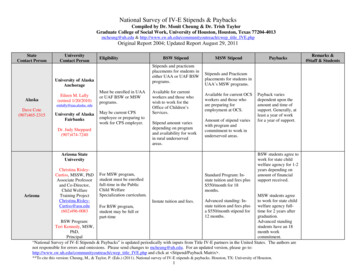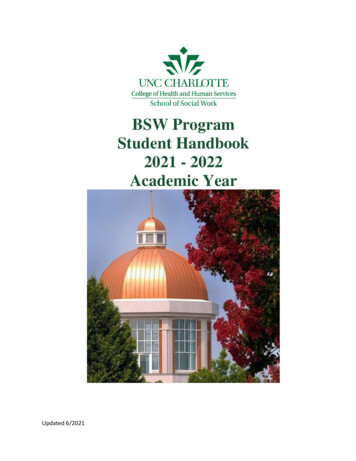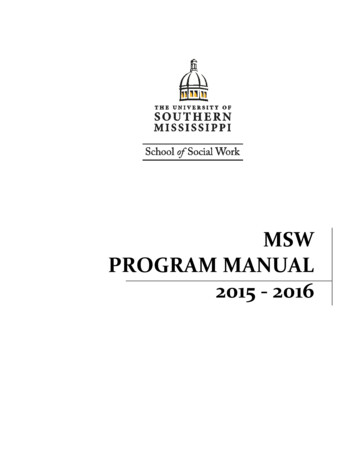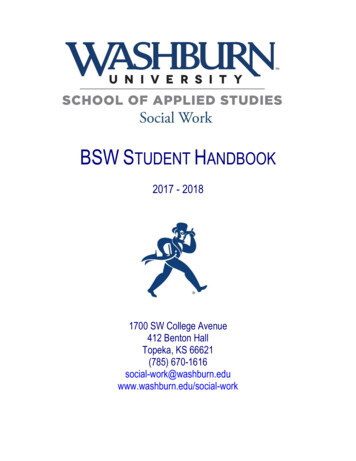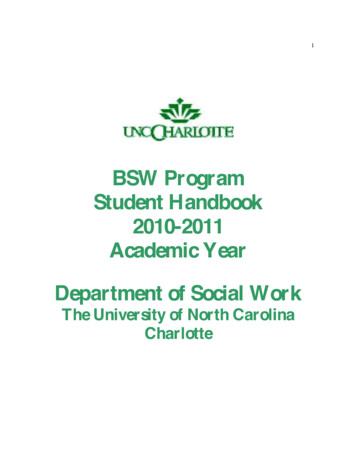
Transcription
1BSW ProgramStudent Handbook2010-2011Academic YearDepartment of Social WorkThe University of North CarolinaCharlotte
2Department of Social Work Full-Time FacultyDr. Dennis Long, PhD, Professor, Department ChairDr. Mark Ezell, Ph.D., Professor, MSW Program CoordinatorDr Jeffrey K. Shears, Ph.D., Associate Professor & BSW Program CoordinatorMs. Susan Marchetti, MSW, LCSW, Field CoordinatorMs. Gay Jordan, MSW, LCSW, Coordinator of Admissions & Student ServicesMs. Amy Barsanti, MSW, Assistant Field CoordinatorDr. A. Suzanne Boyd, Ph.D., ACSW, Assistant ProfessorDr. John R. Doherty, Ph.D., MSW, LCSW, LecturerDr. James R. Dudley, Ph.D., LCSW, Professor EmeritusDr. Robert Herman-Smith, Ph.D., MSW, Assistant ProfessorDr. Shanti Kulkarni, Ph.D., Assistant ProfessorDr. E. Othelia Lee, Ph.D., MSW, Associate ProfessorMs. Terri Matthews, MSW, LecturerDr. Susan McCarter, Ph.D., MSW, Assistant ProfessorDr. Diana Rowan, Ph.D., MSW, LCSW, Assistant ProfessorDr. M. Lori Thomas, Ph.D., MSW, Assistant ProfessorDepartment Address and Contact I nformationThe University of North Carolina at CharlotteCollege of Health and Human ServicesDepartment of Social WorkCollege of Health and Human Services 4939201 University City BoulevardCharlotte, North Carolina 28223-0001Phone: 704-687-7938; FAX: 704-687-2343Website: http://www.health.uncc.edu/academic programs.cfm?pname bsw
3TABLE OF CONTENTSWelcome and Introduction ««««««««««««««««««««««««« Social Work as a Profession Social Work Education « ««««««««««««««««««««««««« Generalist Social Work Practice «««««««««««««««««««««««BSW Program Mission, Goals, and Objectives ««««««««««««««««« Program Mission « Program Goals «« Program Objectives ««««««««««««««««««««««««« BSW Degree Requirements ««««««««««««««««««««««««« BSW Major Curriculum Plan «««««««««««««««««««««««« Social Work Course Descriptions ssion to the Social Work Major ««««««««««««««««««««« Lower Division Admission «««««««««««««««««««««« Lower Division Student Advising ««««««««««««««««««« Upper Division Admission «««««««««««««««««««««« Upper Division Student Advising ««««««««««««««««««««Upper Division Progression Policy «««««««««««««««««««««« Field Education «««««Field Practicum Interview «««««««««««««««««««««« Field Practicum Course Sequencing «««««««««««««««««««Liability Insurance Requirements ««««««««««««««««««««North Carolina Child Welfare Education Collaborative ««««««««««« Non-discrimination Policy ««««««««««««««««««««««««« Transfer Credit «««««Credit for Life and Work Experience ««««««««««««««««««««« Residency Requirement « Grade of Incomplete «««BSW Program Standards for Social Work Education ««««««««««««««« 6WXGHQW &RQGXFW « 6WDQGDUGV «««« 3ROLFLHV DQG 3URFHGXUHV IRU UHYLHZ «««««««««««««««««« FDGHPLF 3HUIRUPDQFH H 7KUHH /HYHO 5HYLHZ ««««««««««««««««««««««« Grievance Policy «««« BSW Student Association ««««««««««««««««««««««««« Honors and Awards ««« 'HDQ¶V /LVW ««« &KDQFHOORU¶V /LVW « Commencement Marshals «««««««««««««««««««««« Graduation with Distinction ««««««««««««««««««««««Phi Alpha «««« Outstanding Field Student Award ««««««««««««««««««« Cyril Harper Scholarship ««««««««««««««««««««««« 026262730303030303031313131
47KH :DWHUV %RRN )XQG ««««««««««««««««««««««« (GZLQ &KDSLQ 6RFLDO :RUN 6FKRODUVKLS ««««««««««««««««« 6RFLDO :RUN &RPPXQLW\ GYLVRU\ %RDUG 6FKRODUVKLS ««««««««««« Appendices «««««« Appendix A: Application for Admission to Upper Division ««««««««« Appendix B: Application for Field Education «««««««««««««««Appendix C: Code of Ethics of the National Association of Social Workers «««Appendix D: Council on Social Work Education Educational Policy and AccreditationStandards «««««««References «««««« 323232333438404256
5Welcome and I ntroductionWelcome to the Department of Social Work Baccalaureate of Social Work (BSW) Program!Social Work education at UNC Charlotte is a long-standing tradition. Social work courses werefirst offered as supplemental courses in the Sociology major in 1970. By 1989 a full BSWDegree program was established. The UNC Charlotte BSW major achieved nationalaccreditation through the Council on Social Work Education (CSWE) in 1992, and the BSWProgram has been nationally accredited ever since. Beginning in 2000, a Master of Social Work(MSW) Program was added to the Department. In the summer of 2006, the Department beganits Advanced Standing Program, allowing those holding the BSW to obtain their MSW in onefull calendar year (May to May). This is an exciting new opportunity for UNCC BSWs and forcommunity members who already possess the BSW degree.UNC Charlotte graduates are employed in areas such as family preservation, mental health,mental retardation, gerontology, child protective services, substance abuse treatment, hospitals,youth and children services, criminal justice, adoptions/foster care, hospice, and long term care.They work from the coast to the mountains of North Carolina as well as across the United States.In earning the BSW degree at UNC Charlotte, you will join the ranks of influential professionalsocial workers who have gone on to make a difference in the lives of thousands of people.Welcome to the challenge!This Student Handbook contains information about the BSW major and the UNC CharlotteDepartment of Social Work. Departmental policies and procedures for entering the major,navigating the curriculum, and proceeding successfully toward graduation are included. Pleasedo read the Handbook in its entirety; a bit of time spent now will greatly enhance yourexperience in the program.Please note: The BSW program requires students to use their UNCC e-mail accounts, and tocheck their accounts at least twice a week while school is in session (including summer sessions,if students are indeed attending). This facilitates good communication between the Departmentand students.The M ission of The University of North Carolina at Charlotte is: UNC Charlotte is the onlyDoctoral/Research University Intensive in the Charlotte region, fully engaged in the discovery,dissemination, synthesis, and application of knowledge. It provides for the educational,economic, social, and cultural advancement of the people of North Carolina through on- and offcampus programs, continuing personal and professional education opportunities, research, andcollaborative relationships with private, public, and nonprofit institutions. UNC Charlotte has aspecial responsibility to build the intellectual capital of this area. As such it serves the researchand doctoral education needs of the greater Charlotte metropolitan region.
6The primary commitment of UNC Charlotte is to extend educational opportunities and toensure success for qualified students of diverse backgrounds through informed and effectiveteaching in the liberal arts and sciences and in selected professional programs offered throughColleges of Architecture, Arts and Sciences, Business Administration, Education, Engineering,Information Technology, and Health and Human Services, and through programs and servicesdesigned to support students' intellectual and personal development. The University offers anextensive array of baccalaureate and master's programs and a number of doctoral programs.With a broad institutional commitment to liberal education as the foundation forconstructive citizenship, professional practice, and lifelong learning, UNC Charlotte is preparedto focus interdisciplinary resources to address seven broad areas of concern to the Charlotteregion: 1) Liberal Education; 2) Business and Finance; 3) Urban and Regional Development; 4)Children, Families, and Schools; 5) Health Care and Health Policy; 6) InternationalUnderstanding and Involvement; and 7) Applied Sciences and Technologies.The M ission of The College of Health and Human Services at the University of NorthCarolina is: The College of Health and Human Services offers professionally recognized andaccessible undergraduate and graduate programs that are nationally and globally relevant, andresponsive to changing needs of health care and human services in the state and region. TheCollege achieves excellence through informed and effective teaching in its degree programs,community partnerships, professional activities and research to advance science and practice inthe health and human service professions.The M ission of the Social Work Department at the University of North Carolina atCharlotte is to prepare competent and effective social work professionals at both beginninggeneralist and advanced specialist levels, to develop social work knowledge, and to provideleadership in the development and evaluation of service delivery systems. This mission will beSXUVXHG ZLWK VSHFLDO DWWHQWLRQ WR WKH UHJLRQ¶V PRVW YXOQHUDEOH SRSXODWLRQV DQG ZLWK D commitment to, and vision of a just and caring society, free of prejudice and oppression.Social Work as a ProfessionThe UNC Charlotte Department of Social Work philosophically aligns itself with the social workprofession as depicted by the professional associations of the National Association of SocialWorkers (NASW) and the Council on Social Work Education (CSWE). According to theNASW Code of Ethics (National Association of Social Workers, 1999), the primary mission ofthe social work profession is to:Enhance human well-being and help meet the basic human needs of all people, withparticular attention to the needs and empowerment of people who are vulnerable,oppressed, and living in poverty. A historic and defining feature of social work is theSURIHVVLRQ¶V IRFXV RQ LQGLYLGXDO ZHOO-being in a social context and the well-being ofsociety. Fundamental to social work is attention to the environmental forces that create,contribute to, and address problems in living.
7Social workers promote social justice and social change with and on behalf of clients.³&OLHQWV LV XVHG LQFOXVLYHO\ to refer to individuals, families, groups, organizations, andcommunities. Social workers are sensitive to cultural and ethnic diversity and strive toend discrimination, oppression, poverty, and other forms of social injustice. Theseactivities may be in the form of direct practice, community organizing, supervision,consultation, administration, advocacy, social and political research and evaluation.Social workers seek to enhance the capacity of people to address their own needs. Socialworkers also seek to promote the responsiveness of organizations, communities, andRWKHU VRFLDO LQVWLWXWLRQV WR LQGLYLGXDOV¶ QHHGV DQG VRFLDO SUREOHPV The mission of the social work profession is rooted in a set of core values. These corevalues, embraced by socLDO ZRUNHUV WKURXJKRXW WKH SURIHVVLRQ¶V KLVWRU\ DUH WKH IRXQGDWLRQ RI VRFLDO ZRUN¶V XQLTXH SXUSRVH DQG SHUVSHFWLYH Service Social justice Dignity and worth of the person Importance of human relationships Integrity CompetenceThis constellation of core values reflects what is unique to the social work profession.Core values, and the principles that flow from them, must be balanced within the contextand complexity of the human experience. (p. 1)CSWE (Council on Social Work Education, 2003) identifies the purposes of social work asfollows: To enhance human well-being and alleviate poverty, oppression, and other forms ofsocial injustice. To enhance the social functioning and interactions of individuals, families, groups,organizations, and communities by involving them in accomplishing goals,developing resources, and preventing and alleviating distress. To formulate and implement social policies, services, and programs that meet basichuman needs and support the development of human capacities. To pursue policies, services, and resources through advocacy and social or politicalactions that promote social and economic justice. To develop and use research, knowledge, and skills that advance social workpractice. To develop and apply practice in the context of diverse cultures. (p. 15)
8Social Work EducationGeneralist Social Work PracticeThe Department of Social Work at UNC Charlotte defines generalist social work practice as theprofessionally responsible application of knowledge, research findings, and skills with acommitment to working with clients and implementing interventions at multiple levels (e.g.individuals, families, groups, organizations, communities, and society).BSW Program M ission, Goals, and ObjectivesThis section will address the UNC Charlotte BSW Program mission, goals, and objectives.Each of these is in keeping with University, College, and Departmental missions as well as withCSWE policies and standards for accreditation of baccalaureate social work programs.BSW Program M issionThe mission of the UNC Charlotte BSW Program is to provide a learning environmentconducive to preparing generalist social work professionals to serve the diverse populations ofthe Charlotte metropolitan region.Program GoalsThe goals of the UNC Charlotte BSW Program are:1. To prepare students for entry level generalist social work practice involving work withdiverse individuals, families, groups, communities, organizations, and society.2. To prepare students interested in pursuing graduate studies in social work with ageneralist practice foundation of knowledge.Program ObjectivesIn order to achieve its mission and goals, the UNC Charlotte BSW Program pursues a range ofobjectives congruent with CSWE educational standards. BSW graduates are expected todemonstrate the ability to:1. Apply critical thinking skills within the context of professional social work practice.2. Understand the value base of the profession and its ethical standards and principles, andpractice accordingly.3. Practice without dLVFULPLQDWLRQ DQG ZLWK UHVSHFW NQRZOHGJH DQG VNLOOV UHODWHG WR FOLHQWV¶ DJH class, color, culture, disability, ethnicity, family structure, gender, marital status, nationalorigin, race, religion, sex, and sexual orientation.4. Understand the forms and mechanisms of oppression and discrimination and apply strategies
9of advocacy and social change that advance social and economic justice.5. Understand and interpret the history of the social work profession and its contemporarystructures and issues.6. Apply the knowledge and skills of generalist social work practice with systems of all sizes.7. Use theoretical frameworks supported by empirical evidence to understand individualdevelopment and behavior across the life span and the interactions among individuals andbetween individuals and families, groups, organizations, and communities.8. Analyze, formulate, and influence social policies.9. Evaluate research studies, apply research findings to practice, and evaluate their own practiceinterventions.10. Use communication skills differentially across client populations, colleagues, andcommunities.11. Use supervision and consultation appropriate to social work practice.12. Function within the structure of organizations and service delivery systems and seeknecessary organizational change.BSW Degree RequirementsThe major in Social Work is based on a liberal arts foundation, augmented by social work andsocial work-related courses. In addition to completing all University general educationrequirements, the BSW major requires that students complete 76 credits made up of 53 credits inrequired SOWK courses and 23 credits in required courses from other disciplines. The coreSOWK courses for the social work major are: SOWK 1101, 2182, 2183, 3100, 3120, 3181, 3182,3184, 3201, 3202, 3482, 3484, 3683, and 3685, one social work elective and one other socialwork or gerontology elective. Other required courses for the social work major are SOCY 1101,BIOL 1110, BIOL 1110L; PSYC 1101, POLS 1110, PSYC 3151, SOCY 4156 & Lab, andForeign Language at the 2050 or 2201 level. Students must acquire a minimum of 120 totalcredits in order to graduate from UNC Charlotte.A sample curriculum layout for the major in social work is listed on the following page.Note: Social work courses can only be used for the major if they have been obtained within thelast five years. Social Work is a professional program, with changes in the field occurringfrequently.Overview of the BSW CurriculumThe primary goal of the BSW Social Work Program is to prepare students for beginning level,generalist social work practice. The Department of Social Work at UNC Charlotte definesgeneralist social work practice as the professionally responsible application of knowledge,research findings, and skills with a commitment to working with clients and implementinginterventions at multiple levels (e.g. individuals, families, groups, organizations, communities,and society). 7KH WHUP ³SURIHVVLRQDOO\ UHVSRQVLEOH DSSOLFDWLRQ UHIHUV WR HWKLFDO SUDFWLFH EDVHG RQ the values (e.g., the NASW Code of Ethics), knowledge, and skills as endorsed by our profession.
10A second goal is to prepare students for graduate education in social work. Consistent with the'HSDUWPHQW¶V 0LVVLRQ SDUWLFXODU DWWHQWLRQ LQ WKH %6: FXUULFXOXP LV JLYHQ WR WKH UHJLRQ¶V PRVW vulnerable populations and with a commitment to and vision of a just and caring society, free ofprejudice and oppression.The curriculum is designed so that students complete most of the liberal arts foundation coursesduring the first two years. Students begin taking social work courses during the second year,including the Introductory course (SOWK 1101) and the Human Behavior and SocialEnvironment (SOWK 2182, 2183) Content Area courses. From the beginning, introductory(second year) social work courses expose students to the Diversity, Populations-at-Risk andSocial and Economic Justice, and Values and Ethics, which are either infused or integrated intothe other cRXUVHV ³,QIXVHG UHIHUV WR LQFRUSRUDWLQJ WKH &RQWHQW UHD LQ DOO FRXUVHV ZKLOH ³LQWHJUDWHG UHIHUV WR LQFRUSRUDWLQJ WKH &RQWHQW UHD LQ PDQ\ EXW QRW QHFHVVDULO\ DOO RI WKH courses.The curriculum is integrated vertically as it builds from the second to third to final year. The HBSEcourses, which are taken in the second year, provide a broad base of knowledge and conceptualmaterial that is utilized in the other Content Areas that follow. Examples include systems theory,theories relevant to various system levels, human diversity, life cycle theory, and social justiceconcerns. Other Content Areas (Diversity, Policy, Populations-at-Risk and Social and EconomicJustice, and Research) are either introduced or elaborated upon during the third year emphasizingsocial welfare, policy, and social work electives. The research methods, practice courses, and fieldeducation (Practicum and Seminar) are offered in the final year where students integrate and applytheir learning from content areas in a field setting as a generalist social worker. In the fieldseminars, students are required to complete assignments that build upon learning in previouscourses: case analyses, an agency analysis paper, a practice evaluation assignment, and anintegrative journal. Transfer students typically follow the same pattern described for four-yearstudents, with the exception that most or all of their first two years of liberal arts foundation havealready been completed.
11BSW M ajorCurriculum PlanYear 1Fall / SpringSOCY 1101 I ntro Soc (3)PSYC 1101 Gen Psyc (3)BI OL 1110 Prin Bio I (3)Math (3)POLS 1110 I ntro Amer Pol (3)ENGL 1101 English Comp I (3)BI OL 1110L Prin Bio I Lab (1)LBST 1100 Series (3)ENGL 1102 English Comp II (3)Math or Stat or PHIL 2105 (3)LBST 2101 (3)Year 2Fall / SpringApply to Upper DivisionForeign Language 1101 or 1201 (3)Writing Intensive (3)LBST 2200 Series (3)SOWK 1101 Field of SW (3)SOWK 2183 HBSE I I (3)SOWK 2182 HBSE I (3)Elective (3)LBST 2102 (3)Elective (3)Elective (3)Summer 1 / Summer 2Junior Level Transfer Students- Summer Entry OptionSOWK 1101 Field of SW (3)POLS 1110 I ntro Amer Pol (3) (I fneeded)SOWK 2183 HBSE I ISOWK 2182 HBSE I (3)Year 3Fall / SpringSOWK 3120 Div & Pop at Risk (3)SOWK 3201 Found. Social Welfare (3)SOWK Elective (3)SOWK 3202 Soc. Wel. Policy (3)SOWK or GRNT Elective (3)SOCY 4156L Quan Anay Lab (1)SOCY 4156 Quan Analy (3)PSYC 3151 Abn Psyc (3)Foreign Lang 2050 or 2201 (3)Year 4Fall / SpringSOWK 3482 Field Placement I (6)SOWK 3683 Field Seminar I (1)SOWK 3685 Field Seminar I I (1)SOWK 3181 Practice M ethods I (3)SOWK 3100 Res M ethods (3)SOWK 3184 Practice M ethods I I I (3)Total Hours in Social Work M ajor 76Total Hours in Curriculum Layout 121SOWK 3484 Field Placement I I (9)SOWK 3182 Practice M ethods I I (3)
12Social Work Course DescriptionsSOWK course descriptions are listed in this section. Descriptions for required relateddiscipline courses may be found in the University Undergraduate Catalog.SOWK 1101. The Field of Social Work. (3) Historical development and philosophy ofsocial work as a profession: personal and societal needs; methods and organizationalarrangements; and roles and tasks of social workers. (Fall, Spring, Summer)SOWK 2182. Human Behavior and the Social Environment I . (3). Prerequisite: BIOL1110, BIOL 1110 Lab, SOCY 1101, and PSYC 1101. Prerequisite or corequisite: SOWK1101. Human behavior in the social environment in relation to developmental theory andtransitions across the life span. (Fall, Summer)SOWK 2183. Human Behavior and the Social Environment I I (3). Prerequisite:SOWK 2182. Human behavior in the social environment in relation to interactionsamong individuals, families, communities, and larger social systems. (Fall, Summer)SOWK 3090. Topics in Social Work. (1-3). Specialized topics in social work. May berepeated for credit as topics vary. (A list of specific courses offered each term is availablethrough campus course listings.) (Fall, Spring, Summer)SOWK 3100. Social Work Research. (3). Prerequisite: Upper Division standing.Introduction to research methods and skills used in social work. (Fall)SOWK 3120. Diversity and Populations-at-Risk. (3). Prerequisite: Upper Divisionstanding. Issues of race, ethnicity, gender, sexual orientation, social class, age, and abilityin social work practice. (Fall)SOWK 3181. Practice M ethods I . (3). Prerequisite: Upper Division standing.Corequisite: SOWK 3482, SOWK 3683. Generalist social work practice methods with anemphasis on working with individuals. (Fall)SOWK 3182. Practice M ethods I I . (3). Prerequisite: Upper Division standing, SOWK3181. Corequisite: SOWK 3484, SOWK 3685. Generalist social work practice methodswith an emphasis on working with families and groups. (Spring)SOWK 3184. Practice M ethods I I I . (3). Prerequisite: Upper Division standing andSOWK 3181. Corequisite: SOWK 3484, SOWK 3685. Generalist social work practicemethods with an emphasis on working with communities and large systems. (Spring)SOWK 3201. Foundations of Social Welfare. (3) (W). Prerequisite: Upper Divisionstanding. History of and current trends in social welfare; values and conflicts thatinfluence social welfare programming. (Fall)
13SOWK 3202. Social Welfare Policy. (3). Prerequisite: Upper Division standing andSOWK 3201. Nature and development of social welfare policy; implications of policy forprogram design and service delivery. (Spring)SOWK 3482. Field Placement I . (6). Prerequisite: Upper Division standing.Corequisite: SOWK 3181. Directed field experience two days per week undersupervision in selected community agencies. (Fall)SOWK 3484. Field Placement I I (9). Prerequisite: Upper Division standing, SOWK3181, SOWK 3482, SOWK 3683. A continuation of SOWK 3482, directed fieldexperience three days per week under supervision in selected community agencies.(Spring).SOWK 3683. Field Seminar I (1). Prerequisite: Upper Division standing. Corequisite:SOWK 3181. Classroom analysis and discussion of the student field placementexperience. (Fall)SOWK 3685. Field Seminar I I (1). Prerequisite: Upper Division standing, SOWK 3181,SOWK 3482, SOWK 3683. Corequisite: SOWK 3182, SOWK 3184. A continuation ofSOWK 3683, classroom analysis and discussion of the student field placementexperience. (Spring)SOWK 3895. Directed I ndividual Study. (1-4). Prerequisite: Consent of theDepartment. Supervised investigation of a special problem or area of practice. May berepeated for credit. (Fall Spring, Summer)SOWK 4101. Social Work Practice with Older Adults. Prerequisite: Consent of theDepartment. Social work practice with older adults with an emphasis on assessment,intervention planning, and implementation. (On demand)Admission to the Social Work M ajorThe BSW major is designed as a full-time academic program. There are two levels ofadmission to the BSW major: Lower Division Admission and Upper Division Admission.This section will describe each of those levels.Lower Division AdmissionStudents who are in good academic standing at the University are eligible to declareSocial Work as their major. In so doing, they enter into Lower Division admission statusin the major. Lower Division students are eligible to enroll in General Education coursesas well the following courses required for the Social Work major: SOCY 1101: Introduction to Sociology (3 cr.) PSYC 1101: General Psychology (3 cr.) BIOL 1110: Principles of Biology I (3 cr.)
14 BIOL 110L: Principles of Biology I Lab (3 cr.) POLS 1110: Introduction to American Politics (3 cr.) Foreign Language through the 2050 or 2201 Level SOWK 1101: The Field of Social Work SOWK 2182: Human Behavior and the Social Environment I SOWK 2183: Human Behavior and the Social Environment II Social Work Elective CoursesAll Lower Division students are assigned an Academic Advisor in the College of Heathand Human Services Student Services office. Lower Division students are required tomeet with their academic advisor to develop a plan for successfully navigating the socialwork curriculum.Lower Division Student AdvisingLower Division Social Work majors receive academic advising through the Office ofStudent Services (OSS) in the College of Health and Human Services (CHHS) located inColvard 2009. Lower division students are not formally advised by Social Work faculty.Lower Division students are required to complete an advising and curriculumplanning session with an OSS Academic Advisor prior to applying for UpperDivision admission. OSS advisors assist students in developing plans for meeting thecourse requirements of the Social Work major as well as the course requirements of theUniversity General Education program. Lower Division students are responsible formeeting regularly with their OSS advisor to assure they remain on track with courserequirements. Resources that can assist students and advisors with the advising andcurriculum planning process include this Student Handbook, OSS course planningdocuments (both for General Education requirements and Social Work majorrequirements), and the University Undergraduate Catalog (available in hard copy at theUniversity Bookstore and in electronic form on the University web site).Upper Division AdmissionAdmission to Upper Division must be granted before students are permitted to takeUpper Division courses in the BSW major. Admission to Upper Division is predicatedupon students agreeing to full-time enrollment in Upper Division courses. UpperDivision Admission is a selective process. Applications for Admission to Upper Division(available in Appendix A of this Handbook) are accepted twice per year²January andJuly²in order to fill an Upper Division cohort that will begin classes in the Fall. Januaryapplications are due on the first day of Spring semester, and July applications are due onthe first day of Second Summer Session. Students ordinarily apply for Upper Division inconjunction with taking SOWK 2182: Human Behavior in the Social Environment I.Upper Division applications are reviewed in relation to the following criteria:1. Completion of a majority of the University General Education requirementsand Social Work Lower Division courses.2. A minimum overall GPA of 2.0 or higher.
153. A minimum of a grade of C or higher in the following courses: SOWK 1101:The Field of Social Work; and SOWK 2182: Human Behavior in the SocialEnvironment.4. A completed Admission to Upper Division Application (located in Appendix Aof this Handbook), a unofficial University transcript (and unofficial transfertranscripts if applicable), a statement of prior human services-related experience(paid or voluntary), and a written narrative statement (see Application) wherestudents have an opportunity to demonstrate their writing skills and theirunderstanding of professional social work values.Please note: The above listed grade point average is the minimum requirement, and doesQRW JXDUDQWHH DGPLVVLRQ LQWR WKH SURJUDP ,Q DVVHVVLQJ VWXGHQWV¶ DSSOLFDtions, the GPLVVLRQV &RPPLWWHH DOVR WDNHV LQWR DFFRXQW WKH TXDOLW\ RI WKH ZULWLQJ LQ VWXGHQWV¶ personal statement, and their potential fit for the major. When questions about fit occur,the Admissions Committee may consult with faculty about the quality oI D VWXGHQW¶V ZRUN DQG WKHLU VHQVH RI D VWXGHQW¶V DSSURSULDWHQHVV IRU WKH PDMRU ,Q UDUH LQVWDQFHV WKH Admissions Committee may ask a student to appear for a personal interview.After their deliberation, the Admissions Committee makes a recommendation to the BSW&RRUGLQDWRU ZKR ZLOO PDNH WKH ILQDO GHFLVLRQ DERXW VWXGHQWV¶ DFFHSWDQFH RU GHQLDO LQWR the program. Students accepted into Upper Division will be eligible to progress intoUpper Division coursework in the major. Students not accepted into Upper Division areencouraged to meet with their Lower Division C
first offered as supplemental courses in the Sociology major in 1970. By 1989 a full BSW Degree program was established. The UNC Charlotte BSW major achieved national accreditation through the Council on Social Work Education (CSWE) in 1992, and the BSW Program has been nationally accredited ever since. Beginning in 2000, a Master of Social Work
